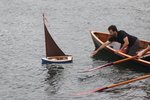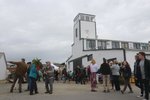Among those who have earned their living as boat riggers, the name Brion Toss has become synonymous with innovation, perpetuation of tradition …
This item is available in full to subscribers.
We have recently launched a new and improved website. To continue reading, you will need to either log into your subscriber account, or purchase a new subscription.
If you had an active account on our previous website, then you have an account here. Simply reset your password to regain access to your account.
If you did not have an account on our previous website, but are a current print subscriber, click here to set up your website account.
Otherwise, click here to view your options for subscribing.
* Having trouble? Call our circulation department at 360-385-2900, or email our support.
Please log in to continue |
|



Among those who have earned their living as boat riggers, the name Brion Toss has become synonymous with innovation, perpetuation of tradition and the intentional aspiration to the perfection of his craft.
But for those who gathered at the Northwest Maritime Center last Thursday to remember the late master rigger, Toss was many other things.
Musician, husband, brother, author, philosopher, martial artist, mentor are just a few of the titles worn by Toss during his 69 years on earth. The stories of the man and what his memory means to the people who loved him were as varied and numerous as the acquaintances and friends he made along the way.
Beneath an overcast sky of undulating clouds and a flurry of gulls above Point Hudson, a crowd of about 100 gathered on the shore to remember the man. Sage was burned and its scent filled the breezeless beachfront as a procession of small boats silently dipped their oars into the water.
The procession was led by the Salish Star, a four-oar racing gig modeled after the American Star. Shortly after the procession arrived in front of the Northwest Maritime Center, Ian Weedman — Toss’ apprentice and the new steward of the loft at Point Hudson — produced from inside the hull of the Salish Star a small model sailboat. The boat was a replica of Toss’ beloved catboat Katy. (The original Katy was a 17-foot Sam Crocker design sailed by Toss during his time in Maine.)
Weedman carefully slipped the boat into the still water and launched the tiny vessel with a light nudge. Nestled inside her cockpit were Toss’ ashes. The boat, driven by a small motor and piloted remotely, tacked and jibed between the procession boats as a brief ceremony started at the water’s edge.
To those in attendance, Barbara Jackson read the poem “Morning.”
“We never leave our loved ones behind, from that first recognition we are one,” Jackson read. “Then a body breathes the last breath and the atoms begin to release into the unknown to begin the process of coalescing into another being, to find a new body home.”
“We are stewards of the good, until it is our time to pass it on,” the poem continued. “… You may already know of the holy tradition of the language of sail, the language of wind and tide that draws each of us here and now. An inheritance more precious than gold.”
“… We wash our hands in saltwater, ablution, the holy blessing becomes love, fear falls away, our first language is our last breath.”
Eight bells tolled, cutting through the morning quiet, the end of the sailor’s watch.
Following the memorial, friends and family of Toss’ congregated over at the Rigging Loft for refreshments and to swap stories of the larger-than-life man.
Toss’ stepson Cody Gruye said Toss came into Gruye’s life at the age of 13 and said it was unlikely that he would’ve become the man he is today without his influence.
“A pillar of the community; wonderful human being,” he said. “He was always teaching somebody something or trying to learn something, to understand things differently or better.”
“He was very thoughtful, always used his talents to better the world around him any way he could, whether it was writing or tying knots with people or passing along stories or just being part of the community,” he said.
Sam Force, a close friend of Gruye’s, said Toss had “so many incarnations for so many different people.”
“For the people in the boatbuilding community he was like this pillar of knowledge that you could always draw from; for me he was my best friend’s stepdad,” Force continued. “I knew him as his rock, his core, so I got to hang out with my buddy in high school and Brion was the guy who would tell us when we were out too late. He was sort of like our center in some ways.”
Like many at the gathering, both Force and Gruye remembered Toss’ laugh.
“No one had a better laugh,” Gruye said. “He was so happy to share his laughter with everyone, and it was only jarring the first time you heard it.”
“It was like a bell, it could cut through the fog,” Force added.
Gruye had no doubt that Toss had made a significant mark on the place he called home.
“The community in Port Townsend was made better by Brion being a part of it and it will continue to be better because he was a part of it,” he added. “His knowledge has been passed on to people who are confident in its application.”
Piper Corbett, Toss’ stepdaughter, said she would remember the man not necessarily for his prowess as a master rigger, but rather for the love that he always showed her mother, Christian Gruye.
“The thing that was the most touching to me were all of the notes that he would leave for my mother every day,” Corbett said with a catch in her voice. “It was when the moment seized him, when he was struck by a moment of any passion, he would write my mother and tell her how much he loved her: ‘I’m going to get treats for your coffee, I’ll be back,’ ‘You were sleeping, I didn’t want to wake you, because I wanted you to rest.’”
Corbett said that while they may have had their differences in her teenage years, she always knew that her stepfather was full of love.
“It’s not easy to have someone come into your life and be a father figure. But he was always so incredibly loving to my mother,” she said. “Every time she walked into the room, no matter what was happening, he would stop and he would say, ‘My bride is here!’ … Every moment was precious.”
Connie Perez, Toss’ sister, said she would remember her brother for his attention to detail and his kindness.
“He was very thorough. He was always like that. He had to have a certain pen, a certain clothing, a very precise guy,” Perez said.
Perez noted that Toss’ passion for rigging boats came later in life after he began tying knots and selling them at the University District Street Fair.
“I think it just evolved from there,” she said. “He was making mats, candleholders, buoy covers — but it never waned.”
“He was a lovely soul, just like the celebration contained. He wasn’t always easy from a familial standpoint, but you knew who you got,” she added.
Toss’ friends, Karen Sullivan and Jim Heumann, were aboard one of the boats in the procession for Toss.
As Heumann piloted the Nauticraft pedal boat, Sullivan sent red roses adrift. Amid the crowd that had gathered at Point Hudson, the pair remembered his aptitude for problem solving.
“Brian has rigged everything from small boats to giant square-rigged ships all over the world,” Sullivan said. “He’s taught people all over the world. He has trained a lot of people to be really good riggers.”
Sullivan said that while the knowledge held within Toss has been passed on to another generation, what is lost in his passing is “his ability to look at an engineering problem of weight and balances and stresses and to come up with a new way of solving it or to improve an old way.”
“He was at the mathematical apex of rigging,” she added. “He was always looking for the mathematical symmetry in a knot and figuring it out.”
“He wasn’t just a traditionalist. He liked the old traditions but he also introduced new ideas with synthetic rigging and things like that,” Heumann said. “He liked the new materials and using those and figuring out how to integrate those with the traditional techniques.”
Sullivan and Heumann also recalled Toss’ good humor and distinctive laugh.
Pointing across the Point Hudson Marina, Heumann said, “If he was working on a boat over there, you knew where he was at.”
Weedman said Toss was cognizant of the necessity to carry on the tradition of ship rigging and sharing his knowledge to build the skills of the next generation. He remembered his mentor as a “passionate man with a very large personality.”
“He had a ginormous heart. And sometimes he would give it to you, sometimes he wouldn’t,” he laughed. “An incredible amount of talent and he knew it.”
“He was passionate about the craft and knew that the only way it could continue was to teach it. It’s kind of this oral tradition of skill, there’s very few books; the biggest one of all was his book,” Weedman said. “Through his writings and apprenticeship programs, this craft will continue. There’s already a few generations in the shop having learned it.”
When asked to share what lessons he’d been taught by Toss over the years aside from those directly related to rigging, Weedman replied with an exasperated sigh and smiled. His sigh elicited at first a low chuckle which quickly turned into hearty laughter among the half-dozen friends who’d gathered to look over the mementos on display.
“We all learned the nuts-and-bolts of these hard-wired skills, how to do all these tangible things, but I think a good teacher teaches you how to ask questions to solve the problems yourself,” Weedman said. “Brion certainly taught that, intentionally or unintentionally.”
Sometimes, Weedman said, the lessons being learned weren’t always easy.
“As he’s teaching these skills and these lessons, nothing would leave the door if it wasn’t perfect,” he continued. “After doing five miles of full-length service on [galvanized] wires he said, ‘Nice job, Ian, it’s sure going to look good when you do it again.’”
“You don’t rush this craft, you just make it perfect.”
Having spent plenty of time learning the ropes from Toss, Weedman said he and his crew were all familiar with the man’s distinctive laugh.
So much so, in fact, they had even given a name to it: the “booming Toss.”
“He could be anywhere and you’d just hear him crystal clear,” he said. “Point Hudson is going to be a much quieter place without him.”